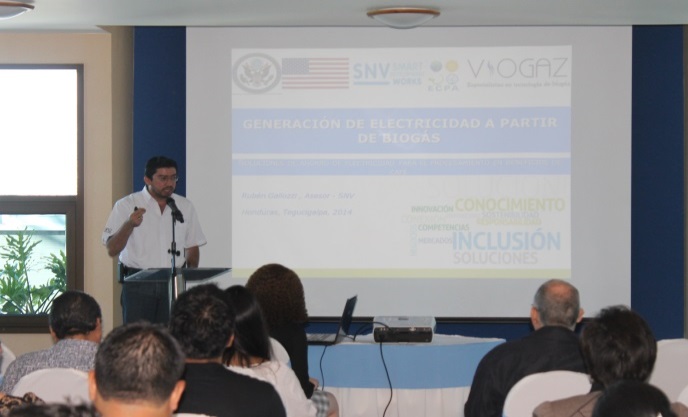
Biomass is biological material derived from living, or recently living organisms. Specifically, biogas refers to a mixture of gases produced by the breakdown of such living or organic matter, in the absence of oxygen. It can be produced from raw materials such as recycled coffee or porcine waste. Biogas is a renewable source of energy, exerting a significantly lower carbon footprint.
 Implementing partners SNV and VIOGAZ, presented the results of their ECPA initiative on electricity savings and clean energy use through biogas for coffee processing and swine production. Project presentations were held on March 4 and 7 in Honduras and Costa Rica, respectively. These technical gatherings raised awareness with regard to the potential for electricity generation from biogas as an alternative energy source. In the food processing industry, this technology has proven effective in lowering energy costs, managing organic waste and reducing environmental risks linked to its treatment. The ECPA implementers used the event to develop new knowledge and encourage public and private institutions to engage in and support renewable energy initiatives.
Implementing partners SNV and VIOGAZ, presented the results of their ECPA initiative on electricity savings and clean energy use through biogas for coffee processing and swine production. Project presentations were held on March 4 and 7 in Honduras and Costa Rica, respectively. These technical gatherings raised awareness with regard to the potential for electricity generation from biogas as an alternative energy source. In the food processing industry, this technology has proven effective in lowering energy costs, managing organic waste and reducing environmental risks linked to its treatment. The ECPA implementers used the event to develop new knowledge and encourage public and private institutions to engage in and support renewable energy initiatives.
This ECPA initiative developed four pilot projects in two swine companies and two coffee cooperatives. Representatives from ARUCO Company in Honduras and RZ Group and Porcina Toledo in Costa Rica, commented on their experience generating electricity from biogas, and shared with the audience concrete results and benefits derived of this initiative. Results included the establishment of four biogas-based electricity generation systems with a collective annual output of 107 MWh and reducing organic waste in sewage water by 72 percent. Important reductions in the Chemical and Biological Demands of Oxygen (CDO/BDO) were also identified by both beneficiaries.
Their interventions also explained the integration and use of renewable energy in their strategic processes, and how this electricity source made their businesses more competitive at both productivity and marketing levels. For instance, both companies highlighted a reduction in their production costs by substituting from-the-grid electricity with renewable energy generated from their own organic waste, as well as an institutional image improvement in local and international markets by being recognized as cleaner, environmentally responsible businesses. Hence, both companies have reduced their carbon footprint while improving competitiveness.
Although the companies’ greenhouse gas emissions were reduced through methane capture and their representatives stressed the challenges that national productive sectors face in incorporating renewable energy sources in their agricultural activities and thus contributing to climate change mitigation.
 View Map
View Map